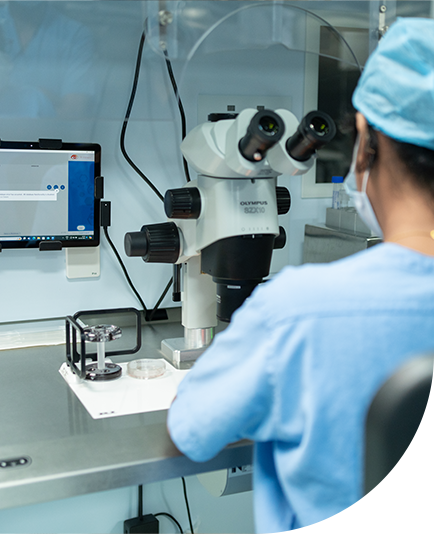IMSI (Intracytoplasmic Morphologically-selected Sperm Injection)

What is IMSI?
IMSI is an advanced form of IVF/ICSI treatment where sperm are selected using high-magnification microscopy to determine the best sperm for injection into the egg. This method allows embryologists to view sperm at up to 6000x magnification, compared to the 200x magnification used in standard ICSI (Intracytoplasmic Sperm Injection).
Who can opt for IMSI?
IMSI may be suggested for:
- Couples who have experienced recurrent IVF or ICSI failure
- Men with a high abnormal sperm morphology (teratozoospermia)
- Couples who have poor quality embryo formation
- Couples with recurrent pregnancy loss and male factor
What are the prerequisites for IMSI?
- Detailed semen analysis assessing sperm quality
- Previous IVF/ICSI records, if available
- A thorough consultation with our fertility specialist and embryologist
How does IMSI work?
The procedure begins similarly to ICSI.
Once the eggs are retrieved from the female partner-
1
Semen is prepared using density gradient centrifugation
2
Sperm are analyzed under a high-powered microscope to identify the healthiest ones
3
The selected sperm is then injected into the egg (ICSI)
4
After successful fertilization, the embryo is transferred into the uterus, as with standard IVF/ICSI
Frequently Asked Questions
How is IMSI different from ICSI?
While both procedures involve injecting a single sperm into an egg, IMSI uses a much higher magnification microscope to select the sperm, allowing embryologists to pick the best possible sperm for injection.
Is IMSI more successful than ICSI?
Some studies suggest that IMSI increases pregnancy rates and reduces miscarriage rates, especially in cases with previous IVF/ICSI failures. However, success varies and depends on the individual patient profile.
Does IMSI increase the chances of having a baby with abnormalities?
Current evidence suggests that IMSI has a similar safety profile as standard IVF ICSI procedures.
